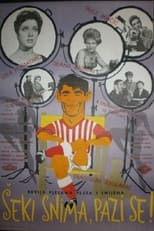Tereza Kesovija
¿Quién es Tereza Kesovija?
Kesovija was born in Dubrovnik and grew up in Konavle and Dubrovnik, where she got her early music education. She won a federal young musicians competition in Ljubljana, Slovenia. Afterwards, she graduated from the flute program at the Zagreb Music Academy, and as a student began appearing in amateur music events. In 1962, shortly after the start of her professional career, she won her first international contest at Saint-Vincent, Italy. After this success, Tereza had a tour in USSR and she recorded there one EP with Italian songs for the biggest Russian music company – Melodiya. She spent 1963 and 1964 touring USSR, Poland, Finland, Denmark, Germany, Switzerland, Norway and Sweden. She also had a lot of TV appearances in these countries.
In 1965, she moved to France, although she did not speak French. There she became a famous star. At the beginning she was singing in cabarets; she was mostly singing in Carević cabaret. She said: "Six tough months, I used to remain in smoke until early in the morning. Waiting for my performances I didn’t know what to do. I was sitting all alone smoking cigarette after cigarette." In 1967, she made the first recording of "La chanson de Lara" (Lara's Theme) from the film Doctor Zhivago.
It was her first big French success sold out in more than 50,000 copies. After album La chanson de Lara she recorded her second French album C’est ma chanson with song "Je l'aime, je l'aime". It was sold out in more than 160,000 copies. With the song "Bien plus fort", Tereza was chosen by Grace Kelly to represent Monaco in the Eurovision 1966. She was frequently called as La bête de scène or Super-Dalida by French press. In 1968, Kesovija performed with Enrico Macias at the L'Olympia in Paris. It was her second Olympia after 1966. She had toured France.
During the 1970s, Tereza became world-known star representing Yugoslav and French song worldwide. In Yugoslavia, her song "Nono, moj dobri Nono" (Grandpa, My Dear Grandpa) was popular. Claudio Villa recorded "Il tuo mondo", an Italian version of Tereza's "Nono" and Mireille Mathieu recorded the French version, "Pour deux coeurs qui s'aiment". She performed on many famous festivals (in Mexico City, Rio de Janeiro, Sopot, Palma de Majorca, Sofia, Istanbul etc.). In Yugoslavia, she was honored with Best Female Singer of the Year Award six years in a row (1974–79). ...
Source: Article "Tereza Kesovija" from Wikipedia in English, licensed under CC-BY-SA 3.0.
Trabajos destacados
Géneros más habituales en las películas de Tereza Kesovija
Géneros más habituales en las series de Tereza Kesovija
Compañeros de trabajo recientes de Tereza Kesovija
Las imágenes y retratos de actores y actrices mostrados en este sitio web son obtenidos de la base de datos pública de The Movie Database (TMDb), utilizada bajo los términos y condiciones de dicha plataforma. En caso de que alguna imagen o fotografía sea incorrecta, ofensiva, o pueda infringir derechos de imagen o copyright, puede ser editada o eliminada directamente en TMDb. Esto provocará su eliminación automática en este sitio web. Adicionalmente, si usted desea solicitar la eliminación de una imagen directamente en nuestro sitio web, puede utilizar el formulario de contacto ubicado al pie de la página. Atenderemos su solicitud de manera expedita y tomaremos las medidas necesarias para garantizar el cumplimiento de los derechos aplicables.
The images and portraits of actors and actresses displayed on this website are sourced from the public database The Movie Database (TMDb), used in accordance with its terms and conditions. If any image or photograph is incorrect, offensive, or may infringe image rights or copyright, it can be edited or removed directly on TMDb. This will automatically result in its removal from this website. Additionally, if you wish to request the removal of an image directly from our website, you may use the contact form located at the bottom of the page. We will promptly address your request and take the necessary measures to ensure compliance with applicable rights.










